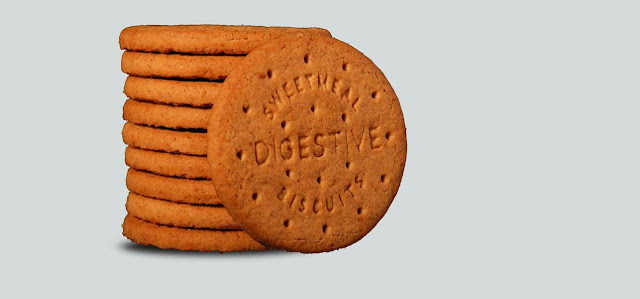Do you like eating digestive biscuits with tea every day? Do digestive biscuits really aid digestion? Ever thought if they are actually healthy for you? If not, then this post will help in clearing up a few myths. Read on and find out how healthy are your digestive biscuits
: What’s In A Name
Don’t judge a food by its name alone. And it holds true for the digestive biscuits too. The term ‘digestive’ may lead many of you to think that cookie aids your digestion. Originated in the 19th century as a food to help digestion, likely because they contained baking soda, digestive biscuits were prepared from coarse-brown bread. The modern-day version of the cookie has however deviated from brown bread and may contain wholemeal wheat flour.
These biscuits are mass produced baked goods that contain primarily wholemeal wheat flour, leavening agents like sodium bicarbonate, ammonium bicarbonate, malic acid and tartaric acid, vegetable oil, powdered skim milk, sugar and of course baking soda (1). The baking soda here is not helping our digestion because heat produced while preparing the biscuits alters its properties.
You might be munching these biscuits thinking they offer a bag full of health benefits, but in reality these cookies are not giving you much nutritive bang.
: Digestive Biscuits Nutritional Profile
How many digestive biscuits do you have with tea? Two? From a health point of view they are not something you should incorporate in bulk quantity in your diet plan. And we have a valid reason! Two digestive biscuits contain about 150 calories, 20 grams of carbohydrates, 6 grams of fat, 5 grams of sugar, 2 grams of protein, 1 gram of fibre and 0.1 gram of sodium. A single biscuit contains 70 calories, which signifies that it offers a lot of energy for very little nutritive value (2).
: Digestive Biscuits Nutritional Profile
How many digestive biscuits do you have with tea? Two? From a health point of view they are not something you should incorporate in bulk quantity in your diet plan. And we have a valid reason! Two digestive biscuits contain about 150 calories, 20 grams of carbohydrates, 6 grams of fat, 5 grams of sugar, 2 grams of protein, 1 gram of fibre and 0.1 gram of sodium. A single biscuit contains 70 calories, which signifies that it offers a lot of energy for very little nutritive value (2).
? Healthy Or Unhealth
: Digestive Biscuits Variations
We have established that digestive biscuits are sugary treats. Still, there are low-fat varieties waiting to entice you. The low-fat digestive biscuits contain nearly 25% lesser fat than the original ones. It might feel a healthier choice at first, but the rest of the ingredients remain the same. Digestive biscuits are also available in chocolate flavors that make them all the more delicious. However, the added chocolate only boosts the sugar content and calorie numbers. A single chocolate-flavored digestive biscuit contains 90 calories. In that case, they might be just taken on a cheat day
: Benefits Of Digestive Biscuits
Usually, whole grains are very beneficial to our health, particularly to the heart. Whole grains help manage diabetes better besides keeping weight under control. When chosen right, digestive biscuits made with whole wheat should provide some benefits. Secondly, the fibre in the biscuits assists in keeping the stomach full. Since many across the world consume less fiber in their diet, they can combat constipation problems with digestive biscuits to some extent. Lastly, as the biscuits contain a high amount of sodium, individuals with extremely low blood pressure can enjoy its benefits.
In conclusion, digestive biscuits are a tasty way to keep hunger pangs at bay. They just do not offer as much as promised. Did this post clear your misconceptions about the biscuits? Please let us know in the comments section below.

















